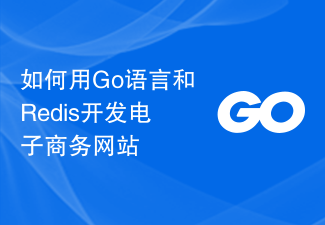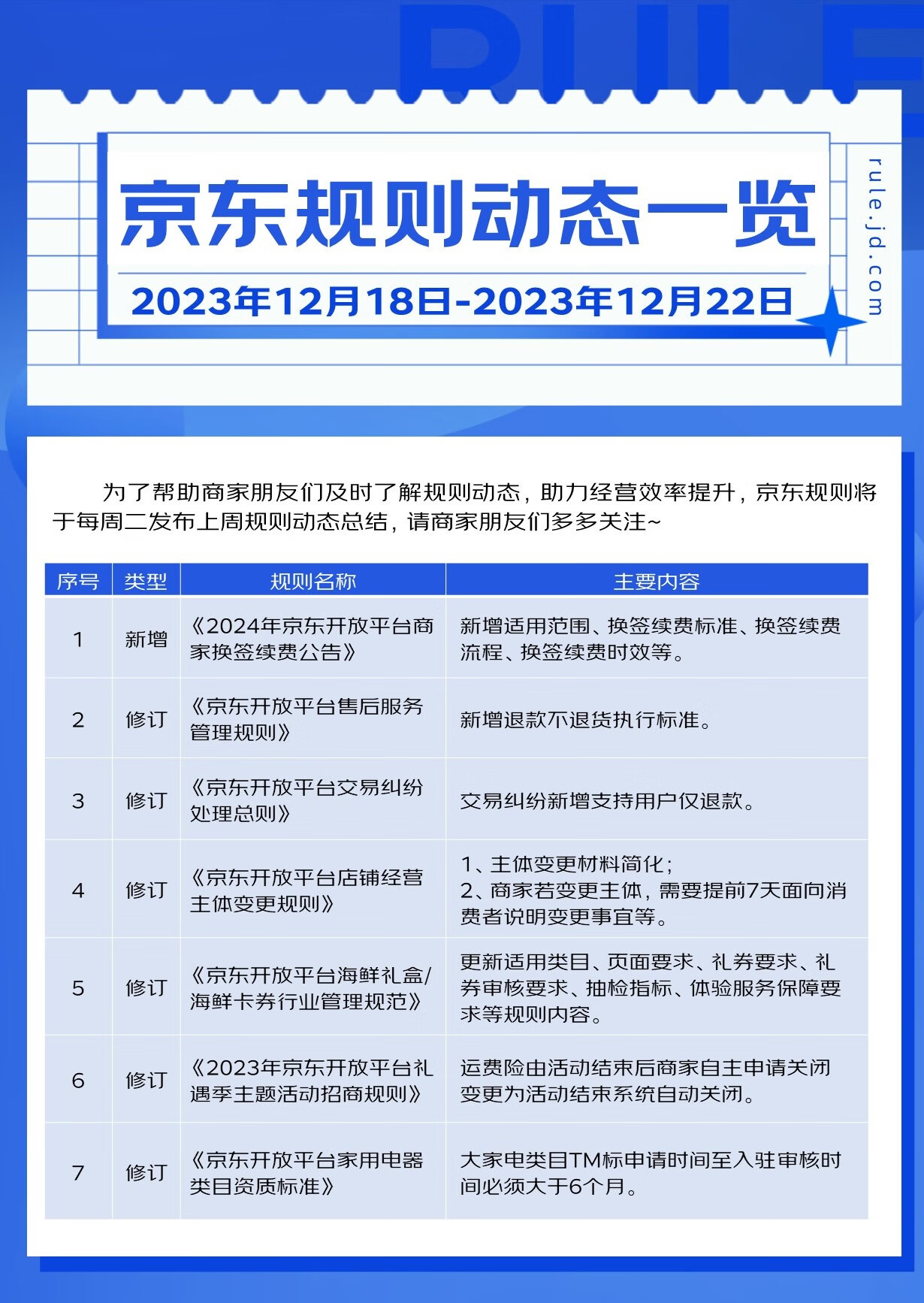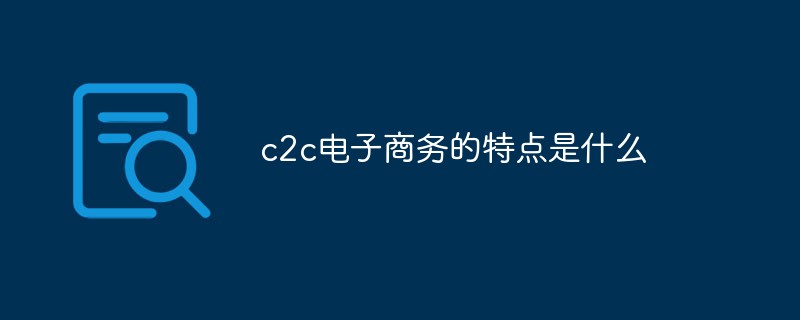 Backend Development
Backend Development PHP Tutorial
PHP Tutorial Application of PHP framework in building multi-vendor e-commerce platform
Application of PHP framework in building multi-vendor e-commerce platformUsing Laravel to build a multi-vendor e-commerce platform, you can enjoy the advantages brought by the framework: rapid development, scalability, security, and flexibility. The steps include: install Laravel, create project, set up database, create model, create controller, create view, configure routing. This article takes creating an Amazon-like platform as an example and details the use of Laravel's Auth module to implement user authentication, create supplier models, product models, order models, use Eloquent ORM to operate the database, and use the Blade template engine to render views.

Application of PHP framework in building multi-supplier e-commerce platform
Multi-supplier e-commerce platform is a kind of A platform where multiple sellers sell their products on the same platform. When building such a platform, one important thing to consider is choosing a suitable PHP framework. This article will introduce the benefits of using PHP framework in the development of multi-vendor e-commerce platform and provide a practical case built with Laravel.
Benefits of the PHP Framework
The PHP framework offers many benefits that make it ideal for building a multi-vendor e-commerce platform, including:
- Rapid development: The framework provides pre-built components that simplify and speed up the development process.
- Scalability: The framework allows you to easily scale the platform to meet a growing user base and transaction volume.
- Security: The framework has built-in security features that help protect the platform from attacks.
- Flexibility: The framework allows you to customize the platform to meet your specific business needs.
Build a multi-vendor e-commerce platform using Laravel
Laravel is a popular PHP framework that is ideal for building a multi-vendor e-commerce platform. It provides an easy-to-use API and rich functionality that allows you to develop your platform quickly and easily.
Here are the steps to build a multi-vendor e-commerce platform using Laravel:
- Install Laravel: Install Laravel using Composer.
- Create project: Create a new Laravel project.
- Set up the database: Set up the database and create the necessary tables.
- Create models: Create models such as users, suppliers, products and orders.
- Create controller: Create a controller to handle user requests.
- Create a view: Create a view to display the platform interface.
- Configure routing: Configure routing to map URLs to controllers and actions.
Practical Case
Suppose we are creating a multi-vendor e-commerce platform similar to Amazon. We will use Laravel and MySQL to build the platform. Here are some key points:
- Use Laravel’s Auth module to implement user authentication.
- Create a supplier model that contains supplier information.
- Create a product model with product details.
- Create an order model that contains order information.
- Use Laravel's Eloquent ORM to query and operate the database.
- Use Laravel's Blade template engine to render views.
Conclusion
The PHP framework offers many advantages for building a multi-vendor e-commerce platform. Using a framework like Laravel, you can quickly and easily develop a scalable, secure, and flexible platform. By following the steps outlined in this article, you can create an Amazon-like multi-vendor e-commerce platform.
The above is the detailed content of Application of PHP framework in building multi-vendor e-commerce platform. For more information, please follow other related articles on the PHP Chinese website!
 php怎么设置implode没有分隔符Apr 18, 2022 pm 05:39 PM
php怎么设置implode没有分隔符Apr 18, 2022 pm 05:39 PM在PHP中,可以利用implode()函数的第一个参数来设置没有分隔符,该函数的第一个参数用于规定数组元素之间放置的内容,默认是空字符串,也可将第一个参数设置为空,语法为“implode(数组)”或者“implode("",数组)”。
 PHP 框架如何简化电子商务网站的维护和管理?Jun 06, 2024 am 10:51 AM
PHP 框架如何简化电子商务网站的维护和管理?Jun 06, 2024 am 10:51 AMPHP框架通过以下方式简化电子商务网站的维护和管理:采用MVC架构,将业务逻辑、用户界面和用户交互分离,实现独立管理;提供预构建组件和模块,减少代码重复并简化网站开发;集成内容管理系统(CMS),使非技术人员轻松管理网站内容;提供辅助工具和命令,自动化任务并简化部署、更新和维护;以Laravel为例,通过EloquentORM、ArtisanCLI工具、Scout搜索引擎集成和Cashier支付网关集成等功能,进一步加强网站管理效率。
 新的电子商务模式有哪些Aug 22, 2023 pm 04:26 PM
新的电子商务模式有哪些Aug 22, 2023 pm 04:26 PM新的电子商务模式有O2O模式、C2M模式、社交电商模式、跨境电商模式和订阅电商模式。详细介绍:1、O2O模式,这是一种将线上和线下商业结合起来的模式,通过线上平台,商家可以推广自己的产品和服务,吸引消费者到线下实体店面进行购买和体验,这种模式可以充分利用互联网的优势,提高线下店面的曝光度和销售量;2、C2M模式:传统的供应链模式是生产商将产品销售给批发商等等。
 生成式人工智能:电子商务领域的下一个前沿Sep 18, 2023 pm 10:09 PM
生成式人工智能:电子商务领域的下一个前沿Sep 18, 2023 pm 10:09 PM随着人工智能的真正潜力刚刚开始显现,技术将帮助电子商务行业实现更高的生产力和卓越的客户服务。随着电子商务初创企业和独角兽企业面临盈利压力和应对客户流失的压力,提高运营效率和提供卓越的客户体验是该行业企业的首要任务之一。人工智能的使用及其通货紧缩效应对于实现这两个目标非常有帮助。集成人工智能的企业可以利用全系统数据,以及基于音频/文本的人工智能自然对话,将其客户服务提升到更高的水平。生成式人工智能可以进一步彻底改变电子商务利益相关者之间的互动原则,这是一组新兴的应用:彻底改变客户支持:客户支持是电
 如何用Go语言和Redis开发电子商务网站Oct 27, 2023 pm 12:30 PM
如何用Go语言和Redis开发电子商务网站Oct 27, 2023 pm 12:30 PM如何使用Go语言和Redis开发电子商务网站引言:随着互联网的发展,电子商务网站已成为购物的主要方式之一。要开发一个高效可靠的电子商务网站,合适的技术选择至关重要。本文将介绍如何使用Go语言和Redis构建一个功能完备的电子商务网站,并提供具体的代码示例。第一部分:搭建环境安装Go语言环境:在Go官网(https://golang.org/dl/)下载并安装
 电商巨头全面接受“仅退款”,京东制定新的退款政策Jan 09, 2024 pm 03:46 PM
电商巨头全面接受“仅退款”,京东制定新的退款政策Jan 09, 2024 pm 03:46 PM昨天,淘宝发布公告,计划修改淘宝平台争议处理规则的相关规定。根据新规定,如果买家满足相关条件发起售后申请,将会进行快速退款或退货退款处理。这与拼多多的“仅退款”政策相似,相信大部分用户对此已有所了解。京东对其开放平台的售后服务管理规则和交易纠纷处理总则进行了修订,新增了用户退款不退货的执行标准。此外,京东还支持用户仅退款,而以前只能申请换货和退货退款。这意味着国内三大电商平台都已加入“仅退款”阵营,不仅淘宝,京东也提供了相应的服务。京东指出,商家交付给消费者的商品存在大量劣质、描述不符、包裹异常
 c2c电子商务的特点是什么Nov 24, 2022 pm 02:04 PM
c2c电子商务的特点是什么Nov 24, 2022 pm 02:04 PMc2c的特点:1、辅助性;C2C对于人类的日常活动来说,是一种互换有无,互相方便的一种买卖关系,对人类正常购买行为的辅助。2、节约性;C2C交易主要应该是二手商品,对二手商品的再次利用本身就是对地球资源的节约。3、繁杂性;C2C中消费者的信息,还是C2C上海量的虚拟商品信息以及少量的消费者的言论评价信息,都说明了C2C的繁杂性。4、创造性;c2c是广大消费者具有创意的交易形式。
 PHP框架在电子商务中的应用:优化网站性能和转化率的趋势Jun 01, 2024 pm 02:05 PM
PHP框架在电子商务中的应用:优化网站性能和转化率的趋势Jun 01, 2024 pm 02:05 PMPHP框架在电子商务中发挥重要作用,提升网站性能和转化率。具体而言,PHP框架可提高性能、可维护性、安全性并简化开发。以Laravel为例,可创建一个简单的电子商务网站,包括商品和类别设置、购物车和订单处理、用户界面设计和部署配置。此外,通过缓存、图像优化和跟踪系统等,可进一步优化网站性能和转化率。


Hot AI Tools

Undresser.AI Undress
AI-powered app for creating realistic nude photos

AI Clothes Remover
Online AI tool for removing clothes from photos.

Undress AI Tool
Undress images for free

Clothoff.io
AI clothes remover

AI Hentai Generator
Generate AI Hentai for free.

Hot Article

Hot Tools

MantisBT
Mantis is an easy-to-deploy web-based defect tracking tool designed to aid in product defect tracking. It requires PHP, MySQL and a web server. Check out our demo and hosting services.

Atom editor mac version download
The most popular open source editor

Dreamweaver Mac version
Visual web development tools

Notepad++7.3.1
Easy-to-use and free code editor

SublimeText3 English version
Recommended: Win version, supports code prompts!





